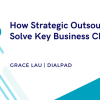A Focus on the Value and Virtue of Supply Chains
After a historically disruptive year, Original Equipment Manufacturers (OEMs) are waking up to the fact that the measure of a supply chain is much greater than its landed costs. Meanwhile, consumers are more vocal than ever about the virtue of the companies from which they purchase. They want products, solutions, and supply chains to reflect their own ideals and aspirations related to sustainability, inclusion and fairness.
In 2021, supply chain sustainability is likely to be more important than ever. As consumers become increasingly concerned with where things are made, the impact on the environment and the kind of companies they buy from, this will in turn lead brands to consider these issues when selecting their supply chain and manufacturing partners.
According to “A More Sustainable Supply Chain,” published by the Harvard Business Review, multinational corporations will ideally use a combination of approaches to encourage sustainable practices throughout their supply networks. A recent IBM and National Retail Federation study found that “nearly six in 10 consumers surveyed are willing to change their shopping habits to reduce environmental impact” and “nearly eight in 10 respondents indicated sustainability is important for them.” While price still has the biggest impact on supply chain decisions, we may be getting closer to a demand tipping point in consumer behavior that will shift which types of products get made and where.
Design for End of Life
It is never too early in the product lifecycle to consider where that product might end up. Most products end up in landfills at their end of life and last for decades or even centuries. End-of-life considerations need to be designed into the product itself. While manufacturers can provide feedback to the designer, the product designer owns the specifications of the product and they must ask some important questions: Are the materials recyclable? Is the product designed for easy disassembly and repair?
Material Selection
Material selection is a huge part of building sustainability. Of course, the best materials are no materials. For all products, we need to evaluate every single part and every single feature and ask ourselves whether it is necessary or superfluous. Unnecessary parts translate into additional material usage and more carbon emissions.
For the remaining design, recyclable materials are key to building with end of life in mind. Design teams need to ask themselves whether the materials they choose can be reground or melted down for reuse in another product. The motto remains reduce -> reuse -> recycle.
Process Selection
The manufacturing process itself is also important to consider. For example, in simple terms, additive processes like 3D printing create less waste than subtractive processes like CNC machining. But sustainability is rarely that simple, and things like energy used in production or the nature of a specific material could make a process that initially seems more sustainable actually less so.
Sourcing and the Supply Chain
What’s more, the whole supply chain has to be considered, not just the directly visible part. Are the raw materials sustainably and responsibly mined or manufactured? How far, and by what method, have those raw materials been shipped? What impact are those materials having on local communities? Getting the whole sustainability picture together is a complex process.
COVID-19 and global trade wars have forced companies to re-evaluate their sourcing strategies and, in many cases, shift to regional manufacturing closer to the point of consumption, ultimately reducing carbon emissions. Taking care to consider the supply chain and logistics is essential when considering the environmental impact of a product. In simple terms, shorter supply chains are likely to do less environmental damage.
While arguments can be made for many different entities to bear the burden of sustainability, the reality is that today it falls to the consumer. Regulation, consumer sentiment and corporate CSR programs could all shift that dynamic over time.
The Value of Sustainability
Consumers care, and they should! We have only one planet and we need to be manufacturing and enjoying products that do not put that planet at risk. It seems highly likely that sustainability will play an increasingly important role in the future development of products, manufacturing ecosystems and of supply chains.









